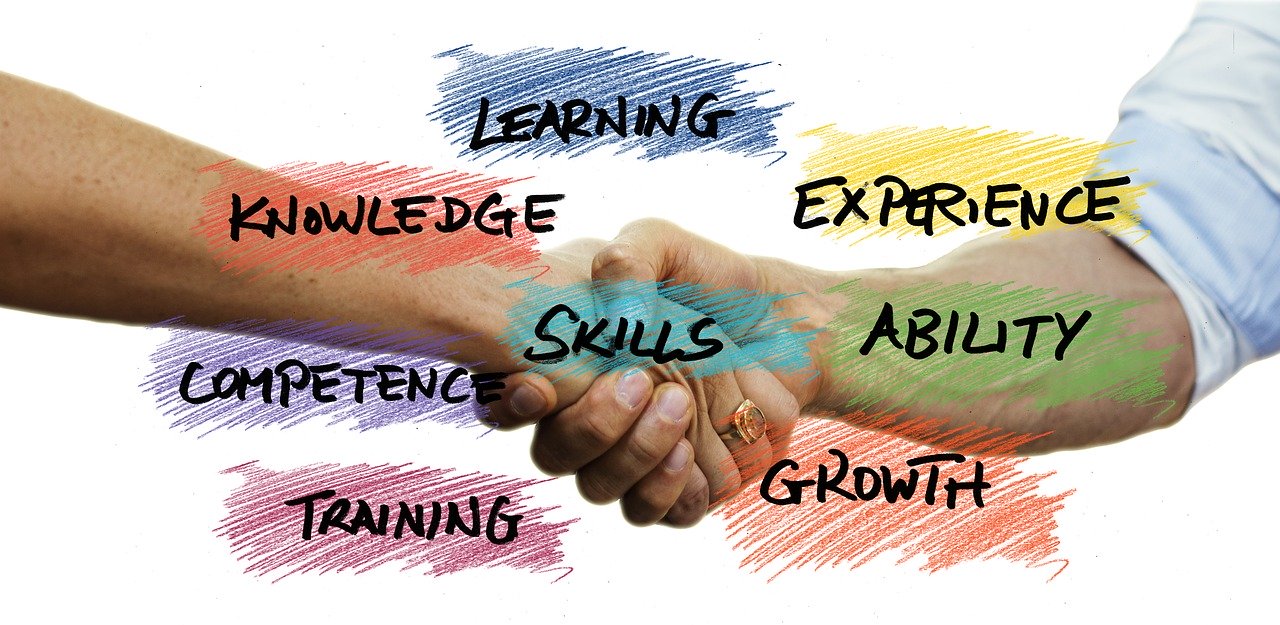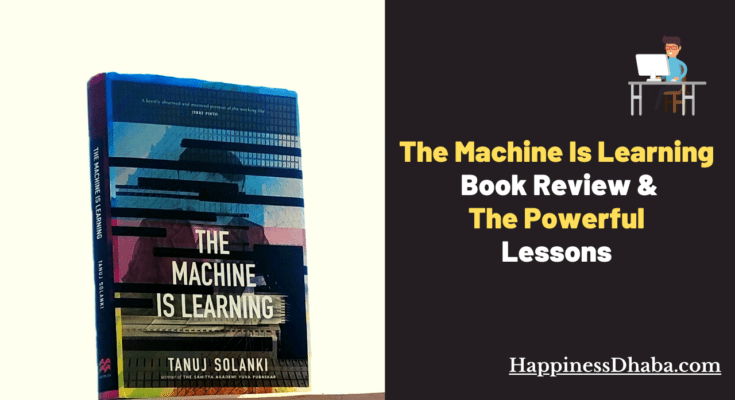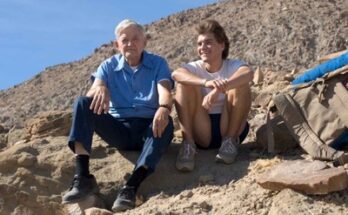Book – The Machine Is Learning
Author – Tanuj Solanki
Publisher – Pan Macmillan India
Genre – Fiction
As is our custom of writing about books, let’s begin with bitter but absolutely true words from the book,
Man-Made algorithm suck. And they suck big time. They suck because the defining quality of human activity is that it is driven by EMOTION, not REASON.
The Central Idea:-
The book Machine is Learning highlights one of the biggest challenges humanity as a whole has ever come across. The challenge that has been invented by the invention of Artificial Intelligence. It’s the challenge of competing with Artificial Intelligence in the Job market. As we stand at the threshold of this transformation the possibility of humans becoming redundant in 80% of the currently available jobs seems very real. This book explores this situation through an Insurance company that is developing an AI system that will make hundreds of employees useless overnight.
About the Book:-
“Inside a 5- Star Hotel in Seoul, Leo Sedol, a grandmaster at the game of Go, is comprehensively beaten by Google Deepmind AI’s AlphaGo program in a five-match series. This marks the mass advertisement for two buzzwords that are already gaining momentum in the IT Industry ― Artificial Intelligence(AI) and Machine Learning(ML).”
With the rate of AI inducement escalating in the corporate sector, Unnikrishnan, the head of Strategic Projects group (SPG) comes to Zepellin, the project den of the SPG to suggest that they too need to understand the technology, and effectively incorporate Machine Learning to solve some of their problems. Saransh, the protagonist is asked to prepare a blueprint of the way in which it can be done.
Saransh comes up with the idea that, to begin with, they can automate all document-checking operations within the company. This marks the beginning of the grand redundancy-inducing project that will result in the firing of hundreds of LOEs.
The decision is made that the work of LOEs will be automated and the LOEs will be fired. The project is named as iblink. Realizing that the quality of past data would determine the success of Machine Learning efforts, the SPG is expanded to include a Data Scientist.
All the past available data is collected and effectively analyzed. The first test on live data results in the realization that the base data has some inconsistencies. The reason identified for these inconsistencies is the lack of standardization in how LOEs handled ambiguous situations at the individual level. What is termed as anomalies in the data collected is actually the applied intelligence, the maneuvers that the LOEs have invented through their expertise to function in the ambiguous situations, the situations for which the company had no standard guidelines. Without incorporating these anomalies the machine cannot give consistent results. To make the data consistent, these anomalies need to be identified. To do so, it is agreed that all the LOEs will be interviewed without letting out the motive behind the interviews.
The process of identifying and recording anomalies begins with the SPG team firing on all cylinders. Meanwhile, Saransh meets a girl named Jyoti via Tinder with whom he spends quality time and discusses his project. Jyoti, who is an ex-journalist loses her temper after realizing that the success of Saransh’s project will make many employees in the company redundant. She feels that “if a child sleeps hungry for even one-night because some new technology made her father lose his job, for her that’s a shame.” The arguments with Jyoti, combined with a few other events that follow give rise to a strange sense of guilt in Saransh’s mind and force him to think if what he is doing is morally correct. To be frank, Jyoti only intensifies the feeling that is already present inside Saransh which is very-well evident from his sensitivity towards the viral picture of Alan Kurdi, the Syrian child who died while trying to escape the war. His sense of outrage clearly reveals how sensitive he is towards human suffering.
Though the project’s success is very much on the cards, still his inner-self is not satisfied. He is surrounded by the cloud of guilt for the work he is doing, One atrocity reminds him of another. And the realization that he is a contributor too in further intensifying human-suffering is really very overwhelming for him. In his words,
I’m making the SPG successful in cutting jobs. Rather, my intellect is making the SPG a monster that eats jobs. Or, my intellect’s success is in eating jobs.
Though it was him who had conceived the project, a part of him no longer wants the project to succeed. He desperately wants the Dehumanising project to stop.
To know what Saransh does next and how the story unfolds, you would have to check out the book.
Lessons from the book:
#1: Keep your skill-set Up to date:-

As is written in the book, every Invention causes disruption. There are people who are left behind. We are no longer in the time when after college we can spend our whole life in one job with the same set of skills. The time requires a lot of unlearning and relearning and that too multiple times. We need to keep adapting to the changing world. The situation reminds me of the words of, Leon C. Megginson
It is not the strongest or the most intelligent who will survive but those who can best manage change.
The most important skill of the current time is the ability to learn new things quickly.
#2: Dehumanisation is Inevitable in most of the current Jobs:-

With the Invention of Artificial Intelligence, the competition in the job market has significantly altered its conformation. From being “Among Humans” it has been transformed into Humans competing against Intelligence Machines to save their jobs.
The situation is unprecedented because it’s for the 1st time in human history that “Intelligence” is not unique to Humans.
Yuval Noah Harari said in his book, Homo Deus,
The seed algorithm may initially be developed by humans, but as it grows it follows its own path, going where no human has gone before – and where no human can follow.
Whether we like it or not, we would have to vacate most of our current job space to make way for the Intelligent Machines whose decisions will be based entirely on reason, free from any emotional bias and thus far more superior than what humans are capable of.
My Favorite part:
The description of the book reads,
The Machine is Learning is a novel about 21st century workplace, love and the impact of tecnology in all of our lives. It interrogates a world order that accommodates guilt but offers no truly ethical course correction.
And that’s the blunt truth about humans. We have space for guilt but hardly have any ethical, at the same time practical solution to get rid of this guilt. Tanuj Solanki, the author has impactfully exposed this through the character of Saransh. After having failed to stop the project, he imagines how his being an instrumental part of the SPG, the group that set into motion, the Machine learning project that helped release significant bandwidth can help him achieve unparalleled professional growth in some other reputed organization.
Tanuj Solanki has literally nailed it when it comes to the ending of the book. The simultaneous display of greed and guilt, the two emotions that even machine will not be able to understand is something I really enjoyed.
Who should read this one?
- Anyone who is interested in a compelling work of fiction.
- A perfect read for people from non-technical backgrounds having little or no knowledge about Machine Learning.
- Anyone interested in knowing how AI is transforming the corporate world.
Grab your copy here from Amazon:-
I hope you loved reading the review and enjoyed the lessons too. It’s one of those books that every fiction lover must check out.
The Best Books:
Recommended Reading Lists
1. Best Books To Help You Develop the HABIT of READING
2. Best Books That Teach the Art of Living a HAPPIER LIFE
3. Best Books on STOCK MARKET & INVESTING
4. Best Books To Help You Find HOPE During Your Darkest of Times
That’s all we have for today. Thanks a lot for tuning in to HappinessDhaba. Do let us know your views on this in the comment section.
Signing off with my favorite words.
Zindagi Zindabad!
Author Profile

Recent Posts
 The Punjabi LiteratureJuly 14, 2025Paash on the Death of Dreams ― Sab Ton Khatarnak
The Punjabi LiteratureJuly 14, 2025Paash on the Death of Dreams ― Sab Ton Khatarnak Blog PostsApril 6, 2025Rebuilding Identity After The Self Falls Apart | by Jasmeet
Blog PostsApril 6, 2025Rebuilding Identity After The Self Falls Apart | by Jasmeet Book Summaries & LessonsFebruary 6, 2025BURN IT ALL: Kafka’s Legacy and the Friendship That Saved It
Book Summaries & LessonsFebruary 6, 2025BURN IT ALL: Kafka’s Legacy and the Friendship That Saved It Life Through SongsJanuary 20, 20259 Best Punjabi Heer Ranjha Songs ― The Modern Playlist
Life Through SongsJanuary 20, 20259 Best Punjabi Heer Ranjha Songs ― The Modern Playlist








